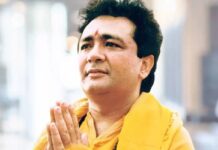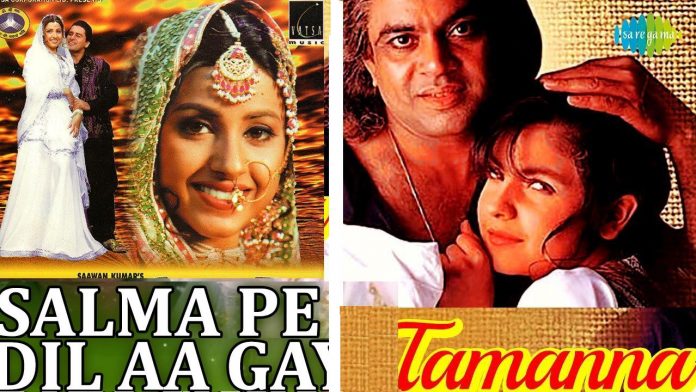SALMA PE DIL AAGAYA
Saawan Kumar Productions’ Salma Pe Dil Aagaya is a Muslim love story. The son and the daughter of two sworn enemies (Sardars) meet in a common friend’s marriage, fall in love and decide to unite in matrimony. But the fathers are against the wedlock. The boy prevails upon his father to forget the dreadful past and bury the enmity by agreeing to his marriage with the daughter of his enemy. Even though the father relents, the girl’s father would hear nothing of it. Sensing danger, the two lovers run away from their homes. It finally falls upon a noble man, who believes in brotherhood and love, to convince the two fathers to accept the alliance.
The film has no novelty either in story or screenplay. While the first half is somewhat entertaining, if only because of three well-tuned songs and eye-catching picturisations (but they come too close in succession), the same cannot be said of the post-interval portion. In fact, the last three or four reels of the film have little relevance or significance because the two fathers have by then agreed to the marriage. The drama thereafter stretches only for an outsider (head of the Sardars) whose importance in the entire scheme of things is never really established. Further, the two fathers have been shown as giving in too easily to be true. One more drawback of the film is that in spite of it being a romantic tale, the audience’s heart doesn’t go out to the two lovers. What the story also lacks is the heroism of the hero who, rather than confronting his enemies, hides from them, alongwith his beloved.
Ayub Khan does fairly well. Saadhika is also quite good. Milind Gunaji’s performance lacks fire. What was required of the character was a dashing performance. Kiran Kumar is very effective as Saadhika’s father. Shashikala also acts ably and brings tears to the eyes in an emotional scene with Kiran Kumar. Mohan Joshi is quite impressive. Mukesh Khanna is fair. Pran is okay but his slow dialogue delivery gets irritating at times. Tiku Talsania, Shiva and the others pass muster.
Direction needed to be more sensitive, considering that the film is a teenage love story. Aadesh Srivastava’s music, as mentioned earlier, is very good. The title song, ‘Dholki bajaao’, ‘Phool main bhejoon’ and ‘Mere paanvon mein mehndi lagee hai’ are all very well-tuned. Song picturisations are very lively and colourful. Action is functional. Dialogues are good at places. Camerawork is quite nice. Background music leaves something to be desired. Editing should have been crisper.
On the whole, Salma Pe Dil Aagaya has not take an encouraging start and does not have the entertainment value to score at the box-office except, perhaps, in some Muslim centres.
Released on 7-3-’97 at Alankar and 13 other cinemas of Bombay by Tiks Movies thru Metro Films. Publicity: excellent. Opening: poor. …….Also released all over except in West Bengal. Opening was unsatisfactory almost everywhere.
TAMANNA
Pooja Bhatt Productions’ Tamanna (A) is an unusual story (inspired from a real-life story) about a eunuch (hijra) who brings up an abandoned girl-child right from the day she is born. The eunuch dotes on the child and gives her the best upbringing even at the cost of himself forgoing the necessities of life. After 18 years, the girl is shocked to learn that her guardian is a eunuch. She sets out to track down her parents and, in this, she is helped by the eunuch, an old friend of the eunuch, and her own childhood friend. Once she reaches her parents, she is further shocked to learn that it was her father who had discarded her because he did not want a girl-child. She then begins to expose her father and his criminal deed till he is arrested.
The story is morose and depressing. Screenplay too provides little by way of entertainment. The treatment of the subject is of the kind which would appeal to a section of the elite audience because there’s no relief, no light moments and no entertainment value. Dialogues are good at places.
Paresh Rawal may have imitated beautifully the real-life eunuch from whose story the film has been inspired, but, for the audience (who haven’t met the real-life eunuch), his performance sometimes looks too good but at other times, it looks as if he were enacting the role of a mentally deranged person (as in Raja). Pooja Bhatt performs with feeling and conviction. Sharad Kapoor has hardly any role. Manoj Bajpai is natural. Akshay Anand does quite well. Kamal Chopra leaves a mark. Nadira, Abha Ranjan, Sulbha Deshpande, Chandu Parkhi and the rest of the cast lend adequate support.
Direction has the typical Mahesh Bhatt stamp — the swing towards authenticity and the overlooking of the commercial and entertainment values. Music is good. ‘Yeh kya hua’ is a good number. Camerawork is quite nice.
On the whole, Tamanna is too dry a subject to be lapped up by the masses or families. Despite the tax-free label in several states, it remains a film for select cinemas in select major cities only. Business in Bombay and South is expected to be good.
Released on 7-3-’97 at Metro (matinee) and 4 other cinemas of Bombay thru Madhuraj Movies. Publicity: very good. Opening: fair. …….Also released in Delhi-U.P., Bengal, C.P. Berar and C.I.
LATEST POSITION
Examinations have adversely affected collections all over.
Judaai has maintained at mediocre collections at most of the places. Is good in Gujarat, Bihar, C.P. Berar and Nizam but poor in West Bengal and C.I. 1st week Bombay 18,76,861 (75.03%) from 8 cinemas (7 on F.H.); Ahmedabad 8,27,982 from 5 cinemas, Baroda 1,44,788, Padra 1,32,947, Rajkot 96,500, Jamnagar 1,12,542 from 2 cinemas (1 in matinee); Pune 5,32,020 from 4 cinemas (1 in matinee), Kolhapur 1,07,040, Solapur 1,28,191; Hubli 1,47,766 from 2 cinemas (1 in noon), Belgaum 1,63,347 (100%), Dharwad 69,692; Delhi 26,19,785 (76.99%) from 9 cinemas; Kanpur 2,02,261, Lucknow 1,55,426, Agra 1,42,500, Allahabad 92,250, Varanasi 1,01,411, Gorakhpur 1,05,000 (62.11%); Calcutta 21,65,842 from 22 cinemas (2 on F.H.); Nagpur 1,98,937 from 2 cinemas, Jabalpur 86,523, Raipur 1,01,994; Indore 1,34,965 (2 on F.H.), Bhopal 2,34,570 from 2 cinemas; Jaipur 5,62,378 from 4 cinemas; Hyderabad 11,42,405 from 6 cinemas, share 5,58,889.
Auzaar dropped badly from mid-week. 1st week Bombay 26,02,295 (74.52%) from 12 cinemas (5 on F.H.); Ahmedabad 6,37,015 from 5 cinemas (2 unrecd.), Baroda 1,42,140, Rajkot 1,04,456 from 2 cinemas (1 in matinee), Jamnagar (matinee) 15,050 (1 in regular unrecd.); Pune 5,58,637 from 5 cinemas (1 in matinee); Hubli 1,15,263 (100%), Belgaum (noon) 41,748 (100%, 1 in regular unrecd.), Dharwad 78,946; Delhi (6 days) 20,76,480 (74.57%) from 9 cinemas (2 on F.H., 1 unrecd.); Kanpur 2,98,264 from 2 cinemas, Agra 1,45,520, Allahabad 1,06,600, Varanasi 1,47,183, Meerut 1,60,680, Bareilly 1,19,554 (67.78%), Gorakhpur 1,10,000 (60.10%); Calcutta 17,82,180 from 20 cinemas; Nagpur 3,85,309 from 4 cinemas, Jabalpur 1,09,794, Raipur 1,04,167, Jalgaon 1,16,203; Bhopal 1,08,358 (1 on F.H.); Jaipur 5,29,337 from 3 cinemas, Ajmer (29 shows) 1,08,174, Bikaner 1,90,000; Hyderabad 29,90,650 from 16 cinemas, share 14,22,000.
…….
DILIP KUMAR IN JODHPUR
Dilip Kumar was in Jodhpur on 7th March to attend a retrospective of his films organised by the Film Society of Jodhpur at Girdhar Mandir cinema from March 7 to 13. The thespian was felicitated. MP Ashok Gehlot and MLA Rajendra Gehlot were present on the dais at the felicitation function. Film Society secretary Mohan Swaroop Maheshwari compered the function.
Dilip Kumar was introduced to the gathering by famous Urdu poet Shin-Kaf-Nizam. A music programme was presented, and Dilip Kumar was especially impressed by the khadtal played by the Mangariars of Jaisalmer. Prof. Rajendra Vaishnav rendered Shiv Stuti as 7th March was Shivratri day. Manmohan Dayal, founder member of the Film Society, spoke on the occasion. The thespian wore a Jodhpuri headgear.
In his address, Dilip Kumar thanked the people of Jodhpur for the honour. Talking about films today, Dilip Kumar said that the reason for their bad quality was the lack of good writers. He also criticised the present entertainment tax structure and fondly recalled that the tax rate during the British Raj was 12.5% only. He lamented that because of the high entertainment tax rates today (which, in some states, was 150%!), the government was filling its coffers but the industry was getting negligible returns. Ashok Gehlot proposed a vote of thanks.
The retrospective started with Dilip Kumar’s Shakti. Rajasthan distributor Rakesh Sabharwal arranged for prints of several Dilip Kumar starrers to be screened in the retrospective.
MUKESH DUGGAL SHOT DEAD
Producer Mukesh Duggal was shot dead by two unknown persons outside his office in Bombay on the night of 7th March. He was in his forties. Underworld don Chhota Shakeel has owned responsibility for the killing. “I got Duggal gunned down for sheltering Nana’s (Chhota Rajan’s) men,” the Dubai-based underworld don and close aide of Dawood Ibrahim said after the murder.
According to the police, the two assailants fired 13 rounds at him around 10.40 p.m. while he was getting into his car. Mukesh Duggal was to leave for Hyderabad in a day or two for the shooting of his Ek Duje Ke Liye.
Duggal was rushed to Cooper Hospital where he was declared dead before admission. He was on the hit-list of Chhota Shakeel for the past several months as he allegedly harboured and financed members of Chhota Rajan’s gang.
Mukesh Dugga had produced Dil Ka Kya Kasoor, Fateh, Platform, Saathi, Milan, Gopi-Kishen, Khilona and Andaz Tera Mastana (unreleased).
BABY GIRL FOR SRIDEVI
Sridevi delivered a baby girl on 6th March at Breach Candy Hospital in Bombay. This is the first child of producer Boney Kapoor and Sridevi.
‘JEET’ JUBILEE
Sajid Nadiadwala’s Jeet is celebrating combined silver jubilee this week in Bombay and Rajkot. Directed by Raj Kanwar, the film stars Sunny Deol, Salman Khan, Karisma Kapoor, Amrish Puri, Alok Nath, Dalip Tahhil, Mohan Joshi, Deepak Shirke, Johny Lever, Ashish Vidyarthi, Arun Khedwar, and Tabu in a special appearance. Music: Nadeem Shravan.
SURENDRA PAL HOSPITALISED
Actor Surendra Pal was injured while enacting a stunt scene for the TV serial Akhir Kyon. He was rushed to Nanavati Hospital and has been advised rest. He will resume shooting after some days.
VINOD RATHOD’S HOUSE-WARMING FUNCTION
Playback singer Vinod Rathod organised a jagran and pooja at his new bungalow, ‘Shivam’, at Kandivli, Bombay, on Maha Shivratri day (March 7). Narendra Chanchal rendered bhajans.
GUDDI MARUTI’S BROTHER SHOT DEAD
Actress Guddi Maruti’s brother, Dara, was shot dead by four unidentified persons in his house at Khar, Bombay, on 4th March. The assailants entered his house around 9.45 a.m., went to the kitchen and pumped 12 bullets into him. Dara was rushed to Bhabha Hospital but was declared dead before admission.
The police has not made any arrests so far.
BHOOSHAN JEEVAN CRITICAL
Actor Bhooshan Jeevan, son of late Jeevan and brother of Kiran Kumar, is critically ill at Hinduja Hospital. His kidneys have failed, and the actor also suffered a cardiac arrest earlier this week.
U.A. THADANI FINE
Bombay exhibitor and distributor U.A. Thadani was discharged from hospital on 5th March. He is fine now and will resume office from 10th March.
SIGNED
S. Raamanathan Signs Karisma Kapoor
Producer-director S. Raamanathan has signed Karisma Kapoor to play the leading lady in Raam Raj Kalamandir’s Prod. No. 9, starring Amitabh Bachchan, Vijayashanti, Arshad Warsi, Tinnu Anand and Shivaji Satam. The film has music by Viju Shah. Story: Om Shree. Screenplay: Prayag Raaj and M.D. Sunder.
MIX MASALA
WHAT’S THE INSIDE STORY?
The story of this week’s release, Tamanna, has been a subject of controversy for months now. There are claims and counter-claims about the origin of the story (is it lifted from a stage play or has it been written by Tanuja Chandra or, as the film’s booklet mentions, jointly by Mahesh Bhatt and Tanuja Chandra?). There is an unusual credit line in the booklet of the other release of this week, Salma Pe Dil Aagaya. While the film’s screenplay is credited to Bhaarat B. Bhalla, there is another credit line which reads: ‘Screenplay Re-Written By Saawan Kumar’. What’s that?
IN & OUT OF BOMBAY
Producer Rahul Gupta and director Shashilal Nair left for the USA on 7th March to scout locations and to finalise the special effects personnel for their HUM PANCHI EK DAAL KE. They will be back after three weeks.
Writer-director M.V. Gopal Ram is at Hotel Seaside (620-0293/97) and will return to Madras on 10th March.
Mr. Naraindas Mukhija of Shree Navchitra Distributors Pvt. Ltd., Jaipur, is expected in Bombay (626-0106) on 11th/12th March.
Producer Dinesh Salgia is in Madras and will return next week.
YOU ASKED IT
Please let us know what the ratios of the various circuits and sub-circuits are these days?
– Quite often, there’s no fixed percentage and the ratios of the various circuits vary from film to film. But, generally speaking, Bombay, Delhi-U.P. and the Eastern circuit are 100% each. East Punjab is 30 to 35%, C.P. Berar 40%, C.I. 20%, Rajasthan 20 to 25%, Nizam 25%, Mysore 10%, Andhra 7.5%, Tamilnad 7.5%, Audio 50 to 150%, Overseas 60 to 125%, India Video 10 to 15%. In Bombay, Gujarat is roughly 35 to 40%, Saurashtra 20%, Thane 25 to 30%, Karnataka 7 to 10%. In the Eastern circuit, West Bengal fetches 25 to 35%, Bihar-Nepal 35 to 50%, Orissa 10 to 15%, and Assam 10 to 12.5%.
What happened to the Maharashtra government’s promise to reduce entertainment tax in the state after 5th March?
– There was no such promise made by the government. The present cabinet meeting in Aurangabad has not taken up the issue of entertainment tax at all. If at all, the issue is likely to be considered in the cabinet meeting on 18th March. By the way, the industry leaders met the Maharashtra revenue minister on 5th.
KAVIRAJ INDEEVAR
The dark night on 28th January, ’97 was further darkened by the failure of electric supply not only in major parts of Bombay, but in many other cities of Maharashtra. A few friends were enjoying the birthday celebration of Shri Ravindra Jain with candles all around, when my wife rang up there to ask if I had received the ‘news’. I asked her, “What news?”; and then she told me that Kaviraj Indeevar-ji had passed away. I immediately tried Indeevar-ji’s telephone numbers, both at Andheri and Bandra, but nobody answered the phone. Finally, I came to know that he had died at the Lilavati Hospital. I rushed there, but there was nobody except the silent body of Indeevar-ji. After contacting a few friends, I was given to understand that the funeral would take place at 10 next morning at the Vile Parle Hindu Crematorium. There was no trace of Indeevar-ji’s mortal remains upto 11 a.m. the following day, and, therefore, I left the place. I was later informed that the funeral took place at around 2.30 p.m. with hardly any close friends from the large film world, attending it. I was also told that the body was claimed by two different persons. I still don’t know if Indeevar-ji’s ashes have been collected and immersed in a holy river and also if the last rites have been duly performed.
Should a great poet, a well-known Hindi film lyricist, who wrote Kya maar sakegi maut usey / Auron ke liye jo jeeta hai, have gone in such a manner? And what to say about such of my friends and colleagues, who know everything of Western culture, including who was seen with whom at which disco, and who was attracting more attention, and who from the pop world is doing what and where, but do not remember the songs written by as great a lyricist as Indeevar. I was really hurt when songs written by others were attributed to Indeevar-ji, in some newspapers.
Shyam Lal Rai ‘Indeevar’, born on 15th August in a village in Uttar Pradesh’s Jhansi district, lost his father when he was only 2 years old, and was brought up by his brother-in-law. At 12, he had started writing poems, and at 14, he wrote a patriotic song on ‘Quit India’, which resulted in his detention. Later, he did his M.A. in Hindi from Allahabad University. He had good knowledge of science, psychology and neurology, and was also interested in music. He saw many ups and downs in his life. Though his songs in Malhar became very popular, he had to struggle hard till he was recognised for his hummable songs in Dulha Dulhan.
Indeevar-ji was an ever-smiling man though he was away from his family. He had divorced his first wife, and the second died leaving an estranged son who lives separately. Indeevar-ji never trusted anybody, but would also not like to live alone. He always liked good company because, as he used to say, “Yaar, akele mein darr lagta hai.” Most of the time, Indeevar-ji would act like a totally uneducated person, asking the other persons the meaning or spellings of even simple words. But those who have seen him in action, moving uneasily like a lion in pain, know that during such ‘fits’, he was a brilliant person, possessed with thorough knowledge of English, Hindi, Urdu, Sanskrit and many other languages; and a large number of subjects. His songs had a touch of romance. He worked with many music directors like Roshan, Shanker Jaikishan, Kalyanji Anandji, Usha Khanna, Rajesh Roshan, Bappi Lahiri, Anu Malik, Timir Basan, S.K. Pal, Shyamal Mitra, Jagjit Singh and Jatini-Lalit. He never spoke ill about others and used to consider Sahir Ludhianvi as a great lyricist. He had high regards for all his colleagues but used to complain that Hindi lyricists were not given their due. Once, he had openly criticised the Urdu lobby for neglecting Hindi poets like Pt. Pradeep-ji. He was indeed very happy when I returned from Delhi after participating in a programme in which Pt. Pradeep-ji was felicitated by I.C.C.R. and the Information & Broadcasting ministry. The Uttar Pradesh governor had informed me last year that Indeevar-ji’s name had been recommended for the U.P. government’s award; but he left before the award could be given to him.
I sincerely wish that the cassette companies bring out special albums of popular songs written by Indeevar-ji. Such albums will do good business for them and, at the same time, satisfy his fans and lovers. I also wish, some close friends would arrange a condolence meeting soon to pay regards to the Kaviraj.
Following are some of the top songs, apart from the latest hits written by Indeevar-ji — Bade armanon se (Malhar – Mukesh, Lata); Jeevan hai Madhuban (Jasoos – Talat); Humne tujhko pyar (Dulha Dulhan – Mukesh, Lata); Kasme vaade pyar wafa (Upkar – Manna Dey); Jis path pe chala (Yaadgaar – Lata); Mujhe naheen poochhani tumse beeti baatein (Anjaan Rahen – Mukesh); Ohe re taal mile (Anokhi Raat – Mukesh); Kaise koy jiye (Badbaan – Hemant, Geeta Dutt); Chhod de saari duniya (Sarawatichandra – Lata); Dil aesa kisine (Amanush – Kishore); Zindagi ka safar (Safar – Kishore); Teri chamakti aankhon (Chhote Babu – Talat, Lata); Koi jab tumhara (Purab Aur Pachhim – Mukesh); Babul pyare (Johny Mera Naam – Lata); Jeevan se bhari (Safar – Kishore); Jo pyar toone (Dulha Dulhan – Mukesh); Madhuban khushboo deta hai (Saajan Bina Suhagan – Yesudas); Nadiya chale chale re dhara (Safar – Manna Dey); Meri pyari bahaniya (Sachcha Jhootha – Kishore); Tumhara pyar chahiye (Manokamna – Bappi Lahiri); Ganga maiya mein jab tak (Suhagan – Lata); Chandan sa badan (Saraswatichandra – Lata, Mukesh); Hothon se chhoo lo tum (Prem Geet – Jagjit Singh); Rambha ho (Armaan – Usha Uthup); Yeh mera dil (Don – Asha); Laila main Laila (Qurbani – Kanchan, Amit Kumar); and some non-film songs like Mil na sakaa mujhko agar pyar tumhara (Mukesh).
Indeevar-ji sometimes used to take help of some friends in developing ideas into songs. I was also lucky to be associated in the making of seven or eight songs; but it was he who used to give the final and finishing touches. He never cheated anybody and was an innocent soul who would not hesitate to confess openly if he considered himself wrong anywhere.
He was recently felicitated in Pune, when he released film producer-industrialist Shammi Chaudhari’s book; and he was to be felicitated in Uttar Pradesh also. On 16th February, ’97, he telephoned me at night and said, ‘Yaar, meri kitaab ka kaam kab karoge? Mere marne ke baad?’; and I laughed and said, “Indeevar-ji, jaldi hi karoonga.” He suffered a severe heart attack the same night, which probably was detected the next day, when family friend Mrs. Pramila Gupta took him to Lilavati Hospital. His long-time secretary, Rima, and some family friends and associates took every possible care. But nobody informed me till I got the news of his death. The only last thing that I could do in his lifetime was to get his Hindi and English letterheads printed. But I feel guilty that I did not take him seriously and could not get his book published.
– Kishan Sharma
In ‘Pardes’ Territory
Shortly after the runaway success of his Ram Lakhan, Subhash Ghai, in an informal chat with the film’s hero, Anil Kapoor, had told him, “Ram Lakhan is now the past. I don’t want to talk about it. Let us now think of our next film instead of basking in the glory of our past achievements.”
If the man did not let success affect his thinking, you can be sure, failure (of Trimurti) couldn’t have shaken his confidence for too long.
And confident he was in Agra where he was shooting the “last major outdoor schedule” of his now almost complete film, Pardes. The unit had shifted to Agra from Hardwar. Actually, it wasn’t Agra where Pardes was being shot. Several kilometres away from Agra, the unit was shooting in the famous mosque of Fatehpur Sikri.
“Thanks to the administration, we’ve been extended so much co-operation to shoot inside,” revealed an enthusiastic Ghai. Alongwith so much co-operation also came so much tension for the unit, because there were crowds of thousands and thousands of star-struck fans who seemed to have forgotten everything else in the world and would reach the location religiously every morning and quit only after pack-up! But there were enough policemen on duty to control the crowds. Amrish Puri would, at regular intervals, make it a point to wave out to the fans, much to their joy. At times, he would also raise his right hand in a gesture of beating them, an action which would make the people literally shout in applause.
Shah Rukh Khan had blood splattered all over his face and clothes, which gave an idea that it was the film’s climax that was being picturised. One had to just guess what was going on because Ghat refused to divulge any part of the film’s story. “Don’t ask me the plot because I’m not going to tell you anything,” he smiled. Then what does one do? “Just enjoy yourself,” he quipped.
The enjoyment came when the songs of Pardes were played for all to hear. The musical genius of Subhash Ghai and Nadeem Shravan was all too obvious in the two songs that one heard. There was Do dil mil rahein hain, magar chupke chupke which had just the violin for music. “No other instrument has been used,” informed Subhash Ghai and explained, “The other sounds you hear are not of instruments, they are effects like the sound of wind etc.” The other song was the climax qawwali which is a potentially hit number.
Besides Nadeem Shravan, Ghai employed the services of Surender Sodhi, Naresh Sharma and Tabun, all music directors in their own right, for all the song recordings.
In Pardes are being introduced two newcomers — model Ritu Chaudhry, who has been rechristened Mahima Chaudhry, plays the heroine, and Apoorva Agnihotri is being introduced as the other hero in the film. Apoorva is the dashing young son of late writer Gyandev Agnihotri. He plays a non-resident Indian and “therefore, I don’t have any song exclusively with Mahima”. Apoorva would not have bagged Pardes had it not been for Mrs. Shatrughan Sinha who is close to both, Ghai and Apoorva. “She suggested that I meet Subhash-ji and when I did, I was selected for the role,” revealed the screen NRI, speaking with an accent. Also making his debut on Hindi screen with Pardes is Akash Singh, son of character actress Asha Singh. Akash is also playing the hero in a South film, besides helping dad O.P. Singh with organising star shows abroad.
Coming back to Pardes, Ghai picturised part of a song at the end of the day. It was a picnic song in which Shah Rukh, Mahima, Apoorva, Alok Nath, Himani Shivpuri, Prachi, Aditya Narayan (Udit Narayan’s son) and master Nagrath (Anil Nagrath’s son) participated.
All through the day’s shooting in the mosque, the artistes had to wear shoes made of cloth, on their own shoes, because the mosque rules don’t permit people to move about in their shoes/chappals. An exasperated Shah Rukh was heard telling Subhash Ghai, “Oh, I’m tired of not being able to shoot in my shoes. Once out of the mosque, I’ll wear shoes all over my body and then shoot!”
The unit did shift out of the mosque, a few kilometres away, just a little before pack-up. But while Ghai and his cast reached the location, the camera van was late to arrive. Tension was mounting as the sun was setting and the light, getting dimmer. Subhash Gahai had lost his cool and could be heard yelling at the top of his voice. The stars kept at a distance from him. Till the camera finally reached….. just in time. A couple of shots were canned on Shah Rukh, Amrish Puri, Mahima and Alok Nath in the green fields dotted with yellow flowers. Did the scenery ring a bell?
Yes, it did. It reminded of Dilwale Dulhania Le Jayenge. Well, actually there were rumours that the story of Pardes was quite similiar to that of DDLJ. Was it really so? Well, Subhash Ghai was going to say nothing about it. Because that would mean revealing the story and screenplay written by Neeraj Pathak and Javed Siddique. So rather than deny the allegation, Ghai would prefer to simply smile.
But not the ones to give up so easily, we did manage to gather bits of information from cameraman Kabir Lal and Amrish Puri. Should we let you in? No, please. Like Ghai, we’ve also decided not to reveal the story! Suffice it to say, there’s plenty of patriotic flavour and colour in the film. There’s also a whole song in praise of our dear motherland. Are the distributors of Pardes already keeping their fingers crossed for tax exemption? Jai Bharat!
– Komal Nahta
3-E
Education-Entertainment-Enlightenment
Unmusical Budget
The Indian music industry is the unhappiest after the Union Budget presented in Parliament on 28th February. For, audio cassettes have been subjected to 8% excise duty. The industry feels, this excise duty will adversely affect its returns. A representation will be made to the government to do away with the proposal of excise. Representatives of top music companies will go to Delhi next week to register their protest.
Holy War
When Dilip Kankaria had sold the audio rights of his Lav Kush to Plus Music, he was a picture of joy and contentment. But today, the agreement for the sale of audio rights is a subject matter of court litigation. Kankaria took Plus Music to court when it refused to pay 50% of the contracted amount even several months after the release of the film’s audio cassettes. In turn, Plus Music has filed a criminal case against Dilip Kankaria, alleging that he had defaulted by not releasing the film and instead, delaying it. In the meantime, it is rumoured that Kankaria is considering reselling the audio rights of Lav Kush to a rival music company. If that happens, Plus’ music repertoire will be minus Lav Kush. In the meantime, the court cases may multiply.
Lab Owners Dancing To Producers’ Tunes?
Some producers have been taking lab owners for a ride these days. And the laboratory owners are more than willing to be fooled, if only because of the cut-throat competition among them. With laboratories vying to get producers to patronise them, their owners don’t mind even lending money to producers for shooting. And extra-smart producers don’t hesitate before changing their laboratories (for the same film) according to their financial needs! The producer of a film, starring the new angry young man, has already changed three laboratories even before the film has gone before the cameras! The three labs in question are Filmcenter, Gemini and Adlabs. Likewise, a young debut-making producer, who is producing two films, is dealing with two laboratories — Filmcenter and Adlabs — for one film.
‘Virasat’: Thrice Lucky
Mushir Riaz are thrilled to bits. Even as the music of their Virasat is faring well in India (it’s a different thing that HMV, for unknown reasons, has not as yet flooded the market with the film’s cassettes so that the supply continues to be short of the demand at some places), the Zee Top 10 countdown show in London has been showing the hit Payalay chunmun chunmun song from the film at no. 1 for the past three weeks! Usually, a song occupies the top place in this programme only once or twice, but Virasat has been thrice lucky! Anu Malik, Javed Akhtar, Kumar Sanu and Chitra should celebrate.




























